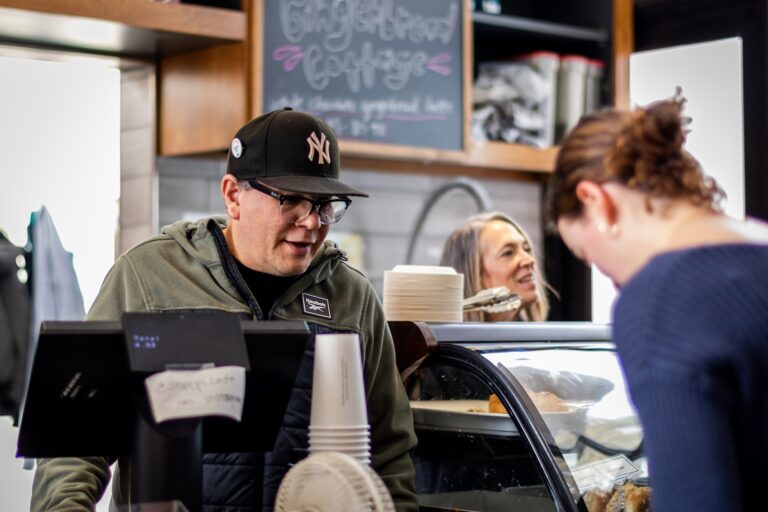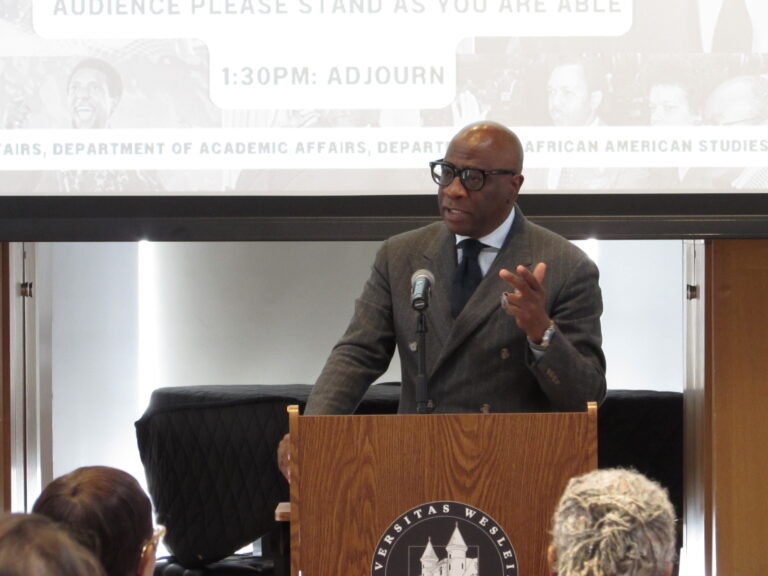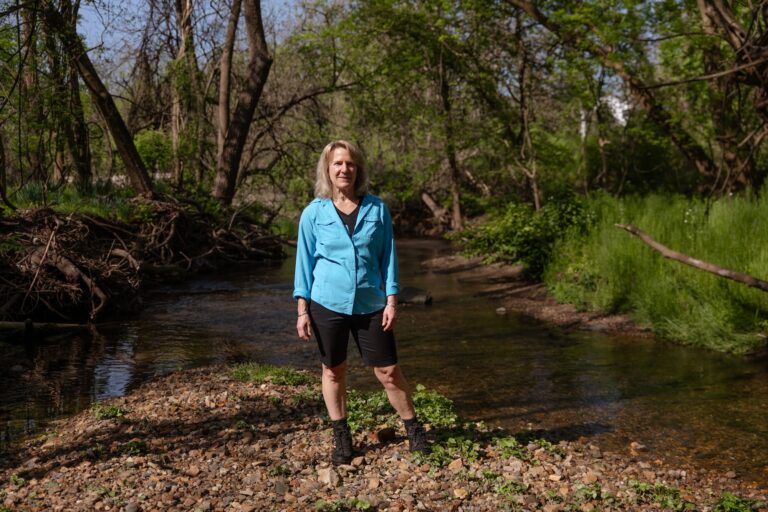Patricelli Seed Grant Winners Announced for the 2021–2022 Academic Year
The Patricelli Center for Social Entrepreneurship (PCSE) announced three winners of the annual PCSE Seed Grants on Monday, Feb. 28: Handom (Aldrean Alogon ’23 and Leonard Majaducon ’25), Nebula (Kya Lloyd ’22 and Jahmir Duran-Abreu ’20), and Outspoken (Akansha Singh ’23, Social Media and Marketing Manager Khushi Jain, and Co-Founder & Lead Curriculum Developer Pratishka Poona). Each winning group will receive $5,000 to help finance their projects.
Established in 2013 with contributions from the Robert and Margaret Patricelli Family Foundation, Propel Capital, and alumni donors, the PCSE Seed Grant aims to provide professional and financial assistance to undergraduate-led entrepreneurial teams who spearhead an enterprise. Each academic year, six finalists are selected by a panel of judges to pitch their ventures to a live audience. Three winners are then selected and awarded the grant money. As PCSE Director Makaela Kingsley explained, each project must address a social issue, in addition to meeting other criteria.

“Projects or ventures must address a social problem; be sustainable, scalable, and/or replicable; and have potential for impact,” Kingsley wrote in an email to The Argus. “We are not looking only to seed emerging organizations or companies; we also encourage applications for projects implemented within already-established organizations. Entries can be for-profit, non-profit, hybrid, or have no legal structure. They can be U.S.-based or international.”
Handom is a mentorship program that educates underserved elementary school students in the Philippines, providing guidance on academics, positive values, and future pathways by pairing up students with tutors and aims to prepare these students to be leaders in their communities. Handom also seeks to collaborate with more curriculum experts and education organizations to develop systematic training in the future.
“Looking at the system, we realized that there are a lot of resources and assets already available, they just need to be connected to the students who need them the most,” Alogon said. “What we are trying to really do here is to have tutors be leaders in their communities so they can be inspiring for kids. The ultimate goal is that these kids get good resources, get into good high schools and colleges, and they do the same things that we do for them. They become tutors as well in the future. It’s a cyclical, hopefully sustainable thing.”
In the pilot part of this project, 20 kids will meet semimonthly with their tutors, who are high school or college students, for academic tutoring that will prepare them for local scholarship opportunities. Specifically, tutors will provide training to help these kids enter the most prestigious public high school with scholarships and receive affordable and high-quality education. The project also includes community immersion trips to places like big companies to help kids to understand the world better. The grants received will be used for paying tutors, funding trips, emergency costs, and food for kids. The project also holds a personal meaning to the founders.
“I would never [have arrived at] what I am right now if there weren’t people who support me and the resources,” Alogon said. “So that is my big dream, to be this person for these kids, to connect them to resources, to help them out so they are also able to have a chance to get these achievements I achieved or probably even more.”
The second winner, Nebula, seeks to provide a social marketplace that assists Black digital designers in becoming successful, profitable entrepreneurs in order to combat the racial inequities within business growth and development, particularly those exaggerated by the COVID-19 pandemic. Nebula aims to do so by partnering with Black-owned businesses through several services, including information sessions and guest speaker events. Nebula has already partnered with experts—including Carmesi, Derrick Adams, Claw Money, and Mal Sounds—who will help provide business owners from underrepresented communities with skills and resources.
“Nebula imagines a new reality for Black-owned businesses where we are supported, prioritized, and highlighted,” Lloyd said during the live pitch. “These are the three values that our students will need in order to succeed: [being] armed with a passion for the craft, a heavy dose of confidence, and an aspiring community makes the impossible finally possible. When Black business owners were asked what support would be most helpful for their businesses outside of government funding, it was mentorship and networking opportunities as the most useful.”
Nebula also includes a unique fund which aims to provide financial assistance to students and collaborative ventures: 10% of the fund’s revenue will support financial aid for eligible students, and the other proceeds from the fund will be available for individuals who submit and pitch collaborative decisions and projects to the Nebula team.
“We named our brand Nebula because we see it as the beginning of everything,” Duran-Abreu said during the live pitch. “What we need is some feedback…brand strategy, identity design, additional funding. What we have now is the passion for making this happen, and for being a positive force, a disruptive force, in the creator economy. Our overall mission is to empower 1 million Black creators to make a living doing what they love.”
The third winner, Outspoken, aims to reduce the high illiteracy rates for women in India by improving access to interactive, quality, online language education. Outspoken’s curriculum teaches English at three levels: the fundamentals of literacy, vocabulary, and narrative writing; application of the language and competency within professional, everyday situations; and using English to raise awareness of healthcare, legal rights, and other social issues.
“The situation was much worse than I thought in India,” Singh said. “What came as a real big revelation to me and my partner was that 68% of women graduated from high school and college, but they weren’t employed…and so I guess that’s where my interest in applying for the PCSC grant and creating an initiative about that came about.”
Having worked for the Indian government during her gap year, Singh has experience combating prominent social issues within India. Now, Outspoken is in the final stages of its curriculum development and looks forward to using the grant money to wrap up its development.
“Because we’re a nonprofit organization and it’s just two university students who have started it, funding is such a huge part when you start doing something, and…we’ve been so grateful for the funding that we’ve had so far from people,” Singh said. “We’re currently looking to finish the final level of video creation, animation scripting, and that requires a lot of financial resources, and that’s what we’re really looking for from the [PCSE Seed].”
In addition to the three winners, the finalists included i connect Africa (Prosper Ndebele ’25, Christine Butawo ’25, Deborah-Gifty Lalude ’25, and consultant Proud Mpala); Nailepu Girls’ Empowerment (Diana Kimojino ’25); and Wesleyan Malagasy Educational Supplies Studio (WesMESS) (Rachel Wachman ’24, Jayne Chen ’24, and Margaret Fitch ’22, and Associate Professor of the Practice in Biology Joyce Powzyk). The six finalists were announced Tuesday, Feb. 8.
i connect Africa is a project that seeks to connect all international African students via online platforms. The venture aims to create and support a community by promoting mentorship among new students, current students, and graduates. It works with other organizations like EducationUSA, KenSap in Kenya, and universities in the United States.
“We aim to create a community that eliminates challenges we face and helps us reach our full potential as a community,” Ndebele said during the live pitch.
Nailepu Girls’ Empowerment is a training program that teaches high school graduate girls in Maasai life skills such as beadwork and hair artistry. As early marriage is a social issue in Maasai, the project hopes to give these girls self-sustaining skills to be independent and continue their education.
“I’m working on empowering girls from my community to bring awareness to the benefits of girl child education in the community,” Kimojino wrote in an email to The Argus. “To achieve a world where girls in the Maasai community reach the highest level of education, there are fundamental barriers that need to be broken…. Poverty encourages young girls to be utterly dependent and voiceless, leading to rampant teenage pregnancies and early childhood marriages.”
WesMESS was established by Rachel Wachman ’24, Jayne Chen ’24, and Margaret Fitch ’22 while in “BIOL161: Science Materials for a Malagsy Classroom.” The students enrolled in the course work in tandem with the IDEAS lab to create and distribute educational science materials to fifth graders in Madagascar. However, due to the drastic impacts of climate change and subsequent food insecurity in the region, Powzyk conceived WesMESS as a means to provide humanitarian support in addition to educational materials.
In the United States, WesMESS creates and sells educational materials in bulk, then donates the proceeds to Centre Technique Agro-écologique du Sud (CTAS), a non-governmental organization in the area which implements new farming techniques to combat food insecurity and empower local communities. Moving forward, WesMESS will form an ongoing half-credit tutorial course led by Powzyk and other students. This tutorial will focus on the production and distribution of educational materials.
“This grant is so important because it gives us a chance to begin an ongoing project which will have a creative and financial impact for Malagasy students,” Wachman, Chen, and Fitch wrote in an email to The Argus. “It will also involve Wesleyan students in an endeavor to use our resources and ideas to create positive change for a community that’s struggling with food insecurity because of climate change.”
To apply for the grant, applicants were required to submit a two-page executive summary of their ventures by the end of January. The executive summary included the problems that the applicants sought to address, their team members, their financial projections, and their goals. A panel of judges then reviewed the applications, provide feedback on their ventures, and selected the six top applicants to be finalists. The six finalists pitched their projects to a live audience on Friday, Feb. 25 at noon over Zoom.
“I was really impressed,” Singh said. “I was so excited to see the initiatives that Wesleyan students are coming up with. It was amazing.”
The judges analyzed the ventures throughout the process based on several metrics, including importance, innovation, organization, feasibility, sustainability, and potential for impact. Moreover, the judges reviewed applicants by their levels of passion, exhibited leadership, and overall commitment.
“Judges [assessed] both the applicant/team and the project/venture,” Kingsley wrote. “The quality of the idea, execution plan, and team will be most important in selecting grantees; in particular, judges will look for applicant(s) who have tested their ideas in real-world settings or have meticulous plans for doing that. Severity of the social problem and potential for impact will be secondary.”
To Livia Cox ’22, a past Seed Grant winner, the application process was significant in cementing the scope, meaning, and longevity of her project.
“Even if we hadn’t won the SEED Grant, the process of applying and the way it required you to crystalize your focus and your purpose, how you would spend that money, who your stakeholders were, really what your mission and purpose was, and to even talk about that, was totally crucial,” Cox said.
According to Cox, the PSCE Seed Grant provides students and their projects with opportunities they may not have had otherwise.
“The idea is something you’re passionate about to really take off and to launch into realms of opportunity and also growth that otherwise wouldn’t necessarily be possible,” Cox said. “It truly is a launching pad that enables students to grow their ambitions, diverse passions, or whatever their project is.”
As with many of this year’s finalists and winners, Cox underscored the importance of the PCSE and Kingsley as sources for support, mentorship, and guidance in and around the grant itself.
“I would definitely recommend that people seek support from Makaela and the Patricelli Center for Social Entrepreneurship,” Cox said. “There are a bunch of really cool people who work within Patricelli. [Take] advantage of things like this has to offer, not just getting $5,000, but also in terms of making connections and speaking with mentors and hope you’ll be a mentor for yourself.”
Kingsley emphasized that the PSCE Seed Grant provides unique opportunities for University students to learn, grow, and express themselves as young entrepreneurs.
“Wesleyan has an array of grants for undergraduates, which is great,” Kingsley wrote. “But this is the only one that calls on students to pitch their projects and ventures in front of a live audience. I know that’s not a challenge that every student is seeking, but it is certainly a transformative learning experience for the people who do it. Being able to communicate your passions and plans through visuals (slides) and words (a script) in a clear, concise, and compelling way is a valuable skill. I appreciate that the PCSE Seed Grant give[s] students the opportunity to practice this.”
Rachel Wachman is a news editor for The Argus.
Oliver Cope can be reached at ocope@wesleyan.edu.
Gloria Cui can be reached at gcui@wesleyan.edu.








Leave a Reply